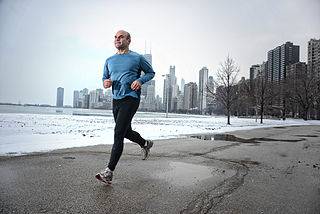
A runner increases his cognitive abilities and mood. Photo by Kyle Cassidy.
Bright tech shirts, running shoes, and bouncing ponytails are a familiar sight to Champaign-Urbana residents this time of year. The Illinois Marathon is just around the corner, and on sunny weekends in April, the twin towns teem with runners training for the big day. Perhaps you are one of them, or maybe you are an observer wondering why anyone would subject themselves to this agony, the lonely mile after mile, the knee-crunching, nipple-chafing, feet-blistering sport of running.
If you are not a runner, running sucks. It’s hard and feels pointless. And often when you begin, you think that you’ll never improve. And man, talking to a runner is just the worst. Get them going and they will often recount training runs and races in excruciating detail. They love comparing horror stories of injuries and how they hit the wall and then kept going, only to collapse at the finish line (but they made it). So, again, why? As it turns out, running actively alters the brain.
Many people know that running releases endorphins, those chemicals that are responsible for making us feel good. High-impact exercise such as running releases endorphins after about thirty minutes, which is long after most beginners give up on the whole thing. It turns out that rather than simply making us feel good, endorphins bind to the same receptors that are in charge of transmitting pain impulses into the brain. So endorphins act as an analgesic, and when released you’re no longer capable of feeling large amounts of pain. It is interesting to note that these opiate receptors the endorphins are binding to are the same receptors bound by morphine and heroin. And similar to these drugs, endorphins have an additive effect. This means that you need progressively more exercise (or longer, harder runs) to achieve that same sense of happiness, which might explain why runners do crazy things such as decide to run 26.2 miles on a Saturday morning.
Endorphins are only part of the story, and the “runner’s high” is generally not often experienced by beginners. Beginners and non-elite runners get their own boost from running a race (or completing a run in general): a dollop of feel-good hormones attributed to something called the “winner effect.” This has been previously attributed to dominance in animals: If an animal wins a fight, even against a weaker opponent, psychological and physiological changes create a sense of euphoria that actually increases the chances of winning a fight again, even against a bigger opponent. This same effect occurs even when you are not fighting someone else, but simply challenging yourself: If you “win” by, say, running a race with your best time, or by completing your goal of finishing your first marathon, your body increases testosterone (yes, even in women) and decreases cortisol, a hormone associated with stress.

A finisher at last year’s half-marathon experiences the winner effect. Photo by Kate Laskowski.
Testosterone amps you up, while stress levels go down, and this increase in testosterone actually makes you more likely to be successful again, resulting in a positive-feedback loop. You feel invincible! You can conquer anything! You pushed yourself too hard and are going to throw up all over the finish line, but you did it! When can you sign up for the next race??
The positive effects of running on the brain are a major area of research right here in Urbana-Champaign. The Beckman Institute is at the forefront of much of this science. They have found that running, more than a variable environment or social interactions, increases neurogenesis in adults; that is, it actually creates more connections in your brain. Researchers here have also recently discovered that runners and other athletes have increased cognitive abilities (e.g. are better at problem-solving tasks) over people who do not exercise regularly. These results are only maintained if you keep exercising, though, so keep going, runners!
So on Saturday, get out there and cheer on those crazy runners! They are probably pretty high on endorphins and winner effects, but could sure use your encouragement to keep them going through the tough miles. You might even see me out there, chugging along the half-marathon route. Feel free to say hi! Just don’t mention the blisters.








